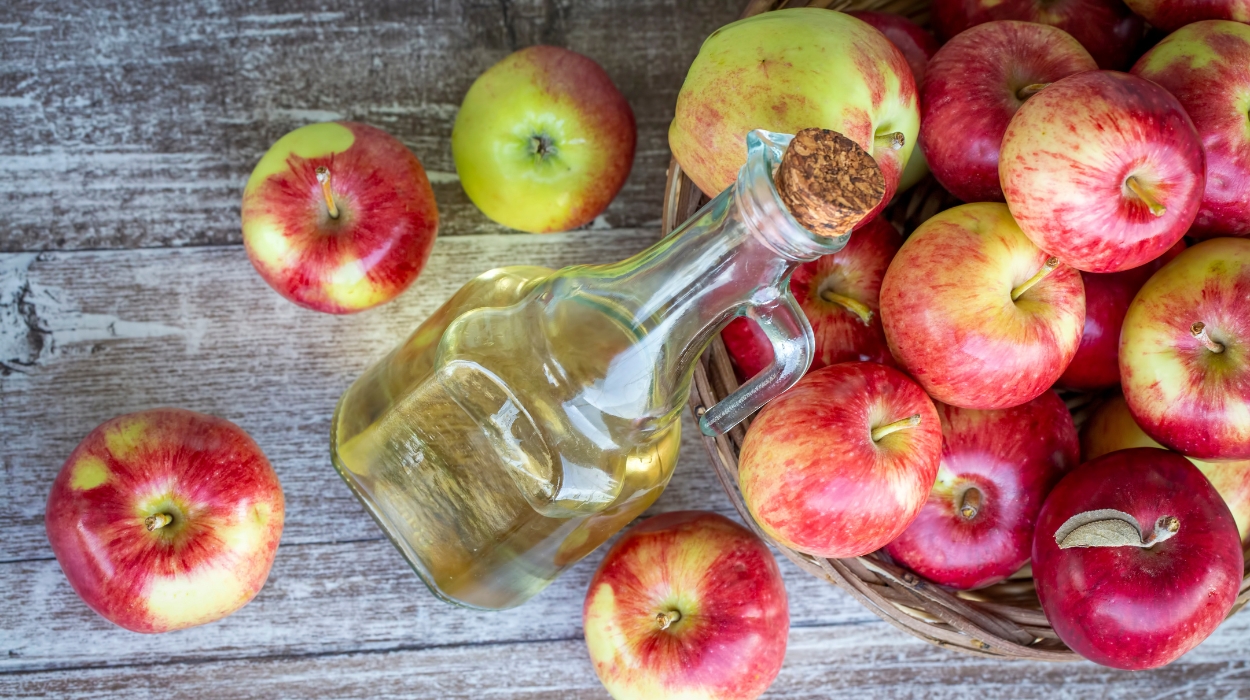Apples are a favorite fruit to many and come in numerous varieties. You can enjoy a fresh apple, bake it in a pie, or make apple cider vinegar. All you need is some yeast and apple juice. But what is apple cider vinegar, and what are its benefits and uses?
Here, you learn more about apple cider vinegar, its health benefits, uses, and potential side effects. Surprisingly, people enjoy drinking apple cider vinegar and applying it as a topical product to benefit the skin. In addition, it may be good for heart health and aid in weight loss.
Keep reading and learn about apple cider vinegar’s benefits, how to use it, and potential side effects.
Is Apple Cider Vinegar Good For You?
Apple cider vinegar is good for you and has numerous health benefits. However, it’s worth noting there are side effects when you use it at home.
Drinking apple cider vinegar can:
- Help lower cholesterol levels.
- Regulate blood sugar.
- Relieve acid reflux.
- Topical apple cider vinegar application may help improve skin health.
- However, it may cause indigestion and throat burns when used excessively and if not appropriately diluted before use.
What Is Apple Cider Vinegar?

- Definition of apple cider vinegar.
- Why understanding apple cider vinegar is important.
Definition Of Apple Cider Vinegar
Apple cider vinegar is a liquid you get after combining yeast and apples in a fermentation process. People have been making apple cider vinegar for centuries, and it’s a beneficial drink.
Essentially, combining apples[1] and yeast begins the process of converting sugar in apples into alcohol. Afterward, you must add bacteria to the mixture to obtain acetic acid once the alcohol ferments.
Apple cider vinegar contains acetic acid,[2] minerals, vitamins, and water. It’s categorized as a ‘weak acid,’ but it comes in a strong, concentrated form.
Why Understanding Apple Cider Vinegar Is Important?
Many people swear by apple cider vinegar. Some consider it a miracle drink. While some of the fame is hype, there are benefits to using and drinking ACV.
Separating the truth from the hype is why you must understand apple cider vinegar.
Apple Cider Vinegar Nutrition Facts
Before diving into the health benefits of consuming apple cider vinegar or using topical apple cider vinegar, it’s good to know the nutrient content. Let’s learn some essential apple cider vinegar nutrition facts.
Apple cider vinegar comes in liquid form, and 100 grams[3] or 3.5 ounces contains 90 calories and 93.8 grams of water. In addition, the same amount of apple cider has 0.4 grams of total sugar, of which 0.3 grams is fructose and 0.1 grams is glucose.
In addition, 100 grams of undiluted apple cider vinegar contains calcium,[4] iron, magnesium, potassium, phosphorus, zinc, sodium, copper, and manganese. It’s also worth noting that you benefit from vitamins and nutrients, such as selenium, present in ACV.
Apple Cider Vinegar Benefits

After proving that apple cider vinegar is nutritious, now we look at its health benefits. Here are some potential health benefits that you may benefit from when using apple cider vinegar at home.
May Help Regulate Blood Sugar Levels
Consuming apple cider vinegar may have numerous health benefits, including lowering blood sugar levels. This may be the most convincing application of this tart drink. Taking apple cider vinegar can work for women and men with type 2 diabetes who must regulate blood sugar levels.
Many diabetes patients must deal with insulin sensitivity,[5] which leads to problems with insulin resistance. But, regulating blood sugar levels[6] benefits overall health and leads to better health.
Consuming apple cider vinegar may positively affect the glycemic index.[7] ACV enhances glucose uptake into the cells, effectively removing it from the bloodstream. However, those with blood sugar management issues should never use apple cider vinegar as a replacement for medication.
May Benefit Total Cholesterol Levels
Using apple cider vinegar as salad dressings can be a good idea as it may reduce cholesterol levels.[8] High levels of bad, low-density lipoprotein, otherwise known as LDL cholesterol, can endanger overall health as it can lead to medical conditions such as poor heart health. That’s why finding ways to lower LDL and boost good high-density lipoprotein or HDL cholesterol levels is essential.
While taking apple cider vinegar may help lower total cholesterol levels, it does not do much for the lipoproteins. Little research indicates that taking apple cider vinegar reduces triglyceride levels[9] or boosts HDL good cholesterol.
Human studies show that ACV may lower blood pressure, thus serving as an effective adjunct to hypertensive treatment[10] modalities.
May Be A Remedy For Certain Skin Conditions
Applying topical diluted apple cider vinegar may be good for your skin health. Apple cider vinegar is a common ingredient in many home remedies, including for skin conditions[11] such as eczema. Some people use topical apple cider vinegar soaks to relieve itchiness and dry skin due to the condition.
People with eczema sometimes suffer from skin that’s less acidic, which is less than ideal since healthy skin is mildly acidic. In such instances, diluted topical apple cider vinegar helps rebalance skin pH levels. At the same time, you can improve the skin barrier and avoid chaffing due to dryness.
Another reason to use apple cider vinegar on your skin is it may have antimicrobial properties.[12] That’s ideal, especially if you have skin infections due to eczema. It’s possible to use diluted apple cider vinegar as a toner as part of your skincare routine.
Apart from eczema, some people claim apple cider vinegar is a good solution for acne. However, there’s no scientific evidence to prove it.
While apple cider vinegar can be an ideal home remedy for skin care, consult your doctor. It’s not a replacement for prescription treatment for eczema or other prescribed skin condition medication.
May Aid In Weight Loss
Perhaps the most hyped-up use of apple cider vinegar globally is to boost weight loss. That’s why you come across thousands of weight loss hacks that consist of drinking apple cider vinegar. Well, it’s not all hype, but it’s best to understand how apple cider vinegar aids in weight loss.
Taking apple cider vinegar may help you lose weight and attain your weight loss goals. How? Drinking apple cider vinegar after a meal is ideal for appetite suppression.[13] Research shows that you remain fuller longer and are less likely to eat frequently or snack.
Weight management requires consuming a calorie deficit, so avoiding constant snacking is ideal. ACV helps you feel full for a longer period of time, thus reducing food intake,[14] which helps you shed extra pounds.
While apple cider vinegar may help you lose fat, it’s not the ultimate solution. Instead, overweight or obese subjects must adopt healthy habits such as eating right, exercising, and even consider taking a supplement to lose weight.
May Ease Acid Reflux
People who suffer from acid reflux are always looking for ways to find relief. Another complimentary medical use of apple cider vinegar is as a form of acid reflux solution.
However, it’s worth noting that there is limited evidence supporting[15] the use of apple cider vinegar products for acid reflux relief. So, be cautious, especially when drinking undiluted apple cider vinegar, and consult with your doctor.
May Help Kill Bacteria
Lastly, you may benefit from taking apple cider vinegar gummies or drinking diluted apple cider vinegar for infections. That’s because the drink has antibacterial properties[16] and can kill harmful bacteria.
Apple vinegar consumption to cleanse the body and tackle health issues isn’t new. Using apple cider to clean wounds and treat infections is over two centuries old. And you can use it as a preservative since research shows it inhibits the growth of harmful pathogens such as E. coli and staphylococcus while benefiting gut health.
Apple cider vinegar is also good for topical use, especially if you have acne. It can help kill bacteria that lead to breakouts and infections on your face.
Potential Side Effects Of Apple Cider Vinegar
It’s not all rainbows and sunshine regarding apple cider vinegar. There are also potential side effects[17] that you must keep in mind.
Indigestion
One common use of apple cider vinegar is suppressing appetite and delaying food intake. As a result, you can eat a calorie deficit and lose weight. However, in some cases, indigestion from too much ACV may be why you eat less food.
Delayed Stomach Emptying
The body requires nutrients to keep functioning. That’s why timely stomach emptying is important to sustain your health. However, apple cider vinegar may cause delayed stomach emptying,[18] adversely affecting the nutrient absorption rate.
Tooth Enamel Erosion
Undiluted apple cider vinegar can be harsh to your tooth enamel. Continuous liquid intake leads to tooth enamel erosion[19] because of acetic acid. That’s why some people drink it using a straw to avoid contact with teeth.
Throat Burns
Never drink undiluted apple cider vinegar, as it can lead to throat burns.[20] Acetic acid burns your throat and esophagus as you swallow the liquid. It’s better to dilute it with water and keep it out of reach of children.
Chemical Burn
Apart from drinking apple cider vinegar, you can also apply it to your skin. Apple cider vinegar has antimicrobial properties that help with inflation and skin infection. However, you must dilute apple cider vinegar before application to avoid issues such as chemical burns.
Acetic acid present in undiluted apple cider vinegar can result in skin irritation,[21] especially with persistent use. The liquid is highly acidic, hence too harsh for your skin. Instead, choose safe DIY remedies for your skin to avoid causing further harm.
How To Use Apple Cider Vinegar
After understanding all the benefits of apple cider vinegar, it’s important to learn how to consume it correctly. Many people prefer using apple cider vinegar as part of salad dressing. Incorporate apple cider vinegar with other salad dressing ingredients for the best taste.
In addition, you can dilute apple cider vinegar with water to drink and even use as a topical product. When drinking apple cider vinegar, less is more, especially if it has the mother, a thick gelatinous layer of bacteria. A teaspoon or two is enough in a glass of water to avoid throat burns.
Ideally, consume a little unfiltered apple cider vinegar to test how your body responds. Also, consult with your doctor, especially if you have health conditions such as eczema and diabetes.
How To Store Apple Cider Vinegar
Apple cider vinegar is good on a shelf. It contains acetic acid and doesn’t need refrigeration. Instead, store apple cider vinegar in a cool and dark place.
Ensure there’s no direct sunlight on the spot, and always keep the cap screwed on tight to slow down aging.
Conclusion
It’s common to come across many diets and hacks that portray apple cider vinegar as a miracle drink. However, always proceed with caution. While apple cider vinegar does have many benefits, it’s good to eliminate the hype.
Human studies show that taking apple cider vinegar may help lower total cholesterol levels, leading to good heart health. In addition, you may regulate blood glucose levels and boost weight loss efforts by incorporating ACV into your meal plan. Apple cider vinegar may also help improve skin health and has antibacterial properties.
However, drinking apple cider vinegar does have potential side effects such as indigestion, tooth enamel erosion, and throat burns. So, proceed with caution when consuming the drink, and always consult with your doctor.
Frequently Asked Questions
You don’t need to refrigerate apple cider vinegar at home. It contains a high amount of acid and has antibacterial properties, making it a self-preserving drink.
Avoid taking apple cider vinegar if you are allergic to apples, yeast, and the drink. Also, people with gastroparesis, which affects stomach emptying, must avoid apple cider vinegar.
Apple cider vinegar does lower LDL bad cholesterol levels. In addition, it boosts good HDL cholesterol, which is important for good heart health.
Apple cider vinegar with mother is the ideal drink form. It means the drink is 100% pure and hasn’t undergone dilution or filtration. It contains the existing bacteria that are good for your health.
It depends. Apple cider vinegar does have numerous health benefits, including aiding in weight loss, lowering cholesterol, and regulating blood sugar levels. However, it can lead to tooth enamel erosion, indigestion, and throat burns.
Apple cider vinegar is fermented. You need to mix crushed apples and yeast to make apple cider alcohol, which undergoes the fermentation process to produce acetic acid.
Apple cider vinegar has diuretic properties but is not a diuretic.

